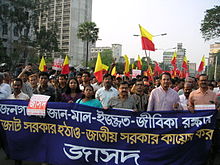Jatiya Samajtantrik Dal
Jatiya Samajtantrik Dal জাতীয় সমাজতান্ত্রিক দল | |
|---|---|
 | |
| Abbreviation | JSD JaSaD |
| Leader | Hasanul Haque Inu |
| Founder | Mohammad Abdul Jalil Serajul Alam Khan |
| Founded | 1972 October 31 |
| Split from | Chhatra League (Awami League) |
| Headquarters | 22/1 Topkhana Road (4th Floor), Dhaka[1] |
| Student wing | JaSaD Chhatra League |
| Armed wing | Gonobahini (1972–76) Biplobi Shainik Sangstha (1973–75) |
| Ideology | Democratic socialism[citation needed] Historical: Vanguardism Revolutionary socialism Scientific socialism[2] Left-wing nationalism |
| Political position | Left-wing[citation needed] |
| National affiliation | Grand Alliance |
| Colours | Red |
| Seats in the Jatiya Sangsad | Parliament dissolved |
| Councillor in City Corporations | 1 / 640 |
| Chairmen in Subdistrict Councils | 1 / 495 |
| Chairmen in Union Councils | 2 / 4,554 |
| Party flag | |
 | |
The Jatiya Samajtantrik Dal (Bengali: জাতীয় সমাজতান্ত্রিক দল, lit. 'National Socialist Party') is a political party in Bangladesh. The party was founded by Serajul Alam Khan. The party was dominant during the 1972–1975 Bangladesh insurgency.
The current party president is Hasanul Haque Inu, and General Secretary Nazmul Haq Prodhan MP.[citation needed]
History
[edit]
The Jatiya Samajtantrik Dal (JASAD) was formed on 31 October 1972[3] when it split from Bangladesh Chhatra League, the student wing of the Bangladesh Awami League, under the leadership of Serajul Alam Khan, M. A. Jalil, ASM Abdur Rab and Shajahan Siraj. It had an armed wing, Gonobahini, led by Colonel Abu Taher and Hasanul Haq Inu, Kazi Aref Ahmed, Monirul Islam, Sharif Nurul Ambia that led a violent left-wing insurgency against the government of Sheikh Mujibur Rahman.[4] Their aim was to form a new left wing democratic national government, for facilitating establishing a socialist state with Bangladeshi characteristics. This led the government to form the Jatiya Rakkhi Bahini, the aim of which was to counter insurgency by the Jatiya Samajtantrik Dal (JASAD) activists.[5]
Assassination of Sheikh Mujibur Rahman
[edit]Before the coup of 15 August 1975, Jatiya Samajtantrik Dal had planned to organize a mass upsurge to form a democratic national government replacing Sheikh Mujibur Rahman.[6]
After Sheikh Mujibur Rahman and his family were assassinated on 15 August 1975, Jatiya Samajtantrik Dal leader Abu Taher showed his support and remarked: "The corpse of Sheikh Mujib should have been thrown into The Bay of Bengal".[6] Hasanul Huq Inu was also seen reportedly dancing above a army tank after the incident.
On 7 November 1975, forces loyal to Colonel Abu Taher rescued army chief Ziaur Rahman from house arrest. When Ziaur Rahman realized that Abu Taher was moving the country into a direction of leftist communism, which contradicted Zia's right wing views, Zia declared martial law, formed the right wing Bangladesh Nationalist Party and cracked down on the Jatiya Samajtantrik Dal by executing Abu Taher and sentencing other leaders to various prison terms.[6][7]
Factions
[edit]During Ziaur Rahman's rule, Jatiya Samajtantrik Dal split up twice. The party fragmented again during the regime of Hussain Muhammad Ershad in the 1980s, with ASM Abdur Rab and Shajahan Siraj heading two separate factions. Abdur Rab's faction, Jatiya Samajtantrik Dal-JSD, became the opposition after taking part in the 1988 elections, that were boycotted by all major political parties. After the Bangladesh Nationalist Party (BNP) came to power in 1991, Jatiya Samajtantrik Dal allied itself with former rivals Bangladesh Awami League to counter growing BNP and right wing influence in the country. ASM Abdur Rab later served as a minister from 1996 to 2001 in the Awami League-led government.[7] After the BNP returned to power in 2001, Shajahan Siraj merged his party with it.[7]
Meanwhile, Inu, who became MP after winning elections as a grand alliance nominee with the victorious Awami League's boat as his symbol in 2008, was made Information Minister.[7] after another split, The General Secretary of the Inu-led faction was Shirin Akhter.[8]
Election results
[edit]Jatiya Sangsad elections
[edit]| Election | Party Leader | Votes | % | Seats | +/- | Position | Government |
|---|---|---|---|---|---|---|---|
| 1973 | Serajul Alam Khan | 1,229,110 | 6.52% | 1 / 300
|
New | Opposition | |
| 1979 | 931,851 | 4.83% | 8 / 300
|
Opposition | |||
| 1991 | Hasanul Haque Inu | 171,011 | 0.50 | 0 / 300
|
Opposition | ||
| 2001 | 119,382 | 0.21 | 0 / 300
|
Opposition | |||
| 2008 | 506,605 | 0.72 | 3 / 300
|
Coalition Government | |||
| 2014 | 203,799 | 1.19 | 5 / 300
|
Coalition Government | |||
| 2018 | 610,044 | 0.72 | 2 / 300
|
Coalition Government | |||
| 2024 | xxxxxxx | xx.xx% | 1 / 300
|
Coalition Government |
See also
[edit]References
[edit]- ^ "Registration of Political Parties". Bangladesh Election Commission (in Bengali). Archived from the original on 15 February 2012. Retrieved 30 December 2008.
- ^ Hossain, Kazi Mobarak (13 March 2016). "Hasanul Haq Inu's JaSoD splits as he names Shirin general secretary". BDNews24. Retrieved 11 July 2016.
- ^ Islam, Sirajul (2012). "Radical Politics". In Sirajul Islam; Miah, Sajahan; Khanam, Mahfuza; Ahmed, Sabbir (eds.). Banglapedia: the National Encyclopedia of Bangladesh (Online ed.). Dhaka, Bangladesh: Banglapedia Trust, Asiatic Society of Bangladesh. ISBN 984-32-0576-6. OCLC 52727562. OL 30677644M. Retrieved 14 November 2024.
- ^ Alim, Syed Fattahul (1 February 2012). "Has Left Politics any Future?". Forum. Vol. 6, no. 2. The Daily Star. Archived from the original on 23 July 2021. Retrieved 17 July 2016.
- ^ Ahamed, Emajuddin (2004). The military and democracy in Bangladesh (PDF). Sydney: Australian National University Press. pp. 108–110.
- ^ a b c Ahsan, Syed Badrul (7 July 2015). "Bourgeois dreams of socialist revolution". The Daily Observer (Bangladesh). Archived from the original on 18 August 2016. Retrieved 14 July 2016.
- ^ a b c d Hossain, Kazi Mobarak (13 March 2016). "Hasanul Haq Inu's JaSoD splits as he names Shirin general secretary violating the party constitution". bdnews24.com.
- ^ "JSD still relevant". The Daily Star. 1 November 2017. Retrieved 18 November 2017.
External links
[edit]- "Jatiya Samajtantrik Dal official" (in Bengali). Archived from the original on 8 January 2015.
- Jatiya Samajtantrik Dal
- 1972 establishments in Bangladesh
- Political history of Bangladesh
- Awami League breakaway groups
- Political parties established in 1972
- Political parties in Bangladesh
- Socialist parties in Asia
- Socialist parties in Bangladesh
- 21st-century Bangladeshi women politicians
- Women members of the Jatiya Sangsad
